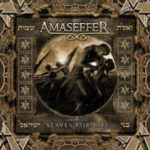Israel. A country with a turbulent past and present, a holy land with ties to the three major religions in the world today (and others as well). It is also home to some outstanding music, including Salem, Distorted and Orphaned land. Enter Amaseffer, which is taken from the Hebrew Am Ha’Sefer, meaning “people of the holy book”.
Slaves For Life begun in 2004 as an idea to bring the Exodus to life by Erez Yohanan. Joined first by guitarist Yuval Kramer, then Hanan Avramovich a year later, Amaseffer was born and the album was underway.
The first in a trilogy of albums, Slaves For Life covers the earlier parts of the Exodus – the bondage of the Hebrews in Egypt, the birth of Moses, his life as an Egyptian and then as an exile in the desert. The album ends with Moses’ return to Egypt, demanding of Pharaoh to free the slaves, and the ten plagues that were unleashed upon Egypt, leaving the Exodus itself for the next two albums.
German singer Andy Kuntz [Vanden Plas, Abydos] was tapped to perform on the album, leading the band to the decision to record in Germany. Delays and other issues made it impossible for Kuntz to continue with Amaseffer at the time, leaving the band to look for a suitable replacement.After looking at a list of potential singers who had expressed an interest in the project, they instead contacted Mats Leven [Therion, Yngwie Malmsteen] after hearing some of his work, and he agreed to lend his voice to the band. The completed music, lyrics and guide vocals were sent to Leven, who completed his work in three weeks.
I must say, this is quite possibly the best Mats Leven has sounded out of everything that I’ve heard him on so far. He does not sound like a last minute replacement; Slaves For Life sounds like it was written with his voice in mind. His duet with Maya Avraham (singing in Hebrew) on “Zipporah” comes across as being one of the vocal highlights of the album, the two seeming to have a chemistry, despite recording separately and at different times.
Kobi Farhi, from fellow Israeli band Orphaned Land, also lends his voice to the band, providing what has been described as “oriental vocals”, which helps give the album an exotic and Middle-Eastern kind of sound. Also making an appearance on “Midian” is Arch Enemy’s Angela Gossow, whose growls are used sparingly, but to great effect. Rounding out the voices are a number of guests who join with the band members (and Kobi Farhi), both for the choir parts and for the bits of dialogue that occur. Bassist Yair Yona contributes to two of the songs, while Amir Gvirtzman and Yatziv Caspi provide flutes and tablas, respectively.
It may take a couple listens or so (and a few hours devoted to the album) for it all to sink in, but it’s well worth it. Over the course of ten songs and running a bit under one hour and twenty minutes, Slaves For Life is an epic sounding journey through the Exodus that could double as a metal soundtrack to “The Ten Commandments”. This is an album that needs to be listened to as a whole to truly appreciate. That’s not to say that the songs themselves aren’t good enough, but they work better when the album is taken in its entirety.
The Exodus should be something most listeners are at least somewhat familiar with, making it easy to figure out where the story is currently at or what’s happening, even during the passages that are sunk or spoken in Hebrew. Complemented by the dialogue and even some sound effects, Slaves For Life is an outstanding effort that does the source material justice and the band has so far done what they set out to do.
Many bands have a hard time topping their debut album and I doubt Amaseffer is going to have an easy task ahead of them, especially considering how strong of an album they have put out already. But if the same musicians and singers are able to return to finish the trilogy, there should be no problem.

